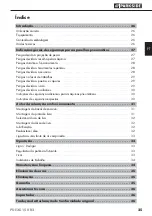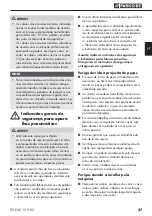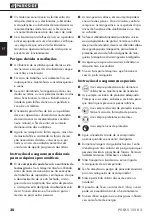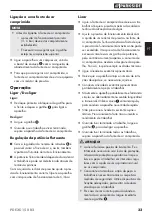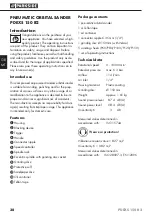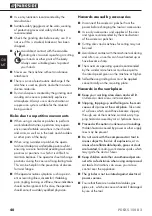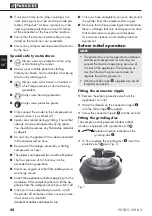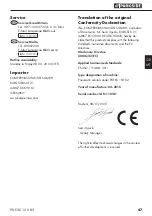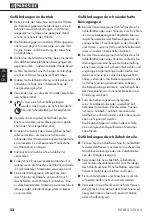
39
PDEXS 150 B2
GB
MT
WARNING!
►
The noise emission levels specified in these in-
structions have been measured in accordance
with the standardised measuring procedure
specified in ISO 15744 and can be used to
make equipment comparisons. The noise emis-
sion values vary in accordance with the use
of the compressed air tool and may be higher
than the values specified in these instructions
in some cases. It is easy to underestimate the
noise emission load if the compressed air tool
is used regularly in a certain manner.
NOTE
►
For an accurate estimate of the noise emission
load during a certain working period, the
times during which the appliance is switched
off or is running but not actually being used
must also be taken into consideration. This
can significantly reduce the noise emission
load over the total working period.
General safety instruc-
tions for compressed
air tools
WARNING!
►
For multiple hazards: Please ensure that you
have read and understood the safety instruc-
tions before adjusting, operating, repairing,
maintaining or replacement of accessories
on the sander or polisher as well as before
working in the vicinity of the machine. Failure
to do this can result in serious bodily injury.
■
The sander or polisher should only be adjusted, set or
used by adequately qualified and trained operators.
■
This sander or polisher may not be modified. Mod-
ifications can reduce the effectiveness of the safety
measures and increase the risks for the operator.
■
Do not use a sander or polisher if the tool has
been damaged.
■
The appliance must be inspected regularly to
ensure that it is labelled with the required rated
values and markings given in this manual. The
user must contact the manufacturer to obtain
replacement labels if necessary.
Save all warnings and safety instructions
for future reference.
The safety instructions should not be lost –
give them to the operator.
Hazards caused by flying parts
■
If a workpiece or accessory or even part of the
machine tool itself breaks, parts can be flung
out at high speeds.
■
When operating the sander or polisher or when
exchanging accessories on the appliance,
always wear eye protection. The degree of nec-
essary protection must be evaluated separately
for each individual task.
■
Wear a safety helmet if working above head
height. In this case, the risks for others should
also be assessed.
■
You must ensure that the workpiece has been
securely fixed.
■
Ensure that the sparks generated during use
cannot cause any hazards.
■
Disconnect the grinder from the power supply
before replacing the grinding material and
before carrying out maintenance work.
■
In this case, the risks for others should also be
assessed.
Hazards caused by entanglement
■
Suffocation, scalping or and/or cut wounds
can occur if loose clothing, jewellery, necklaces,
hair or gloves are not kept away from the
machine and its accessories.
Hazards during operation
■
When using the machine, the operator's hands can
be subject to hazards such as cuts, grazing and
heat. Wear suitable gloves to protect your hands.
■
The operator and maintenance personnel must
be physically capable of handling the size, mass
and power of the machine.
■
Hold the machine correctly: be ready to counter-
act any normal or sudden movements - have
both hands ready.
■
Ensure that your body is balanced and that you
have a secure standing position.
■
Release the start/stop control in case of a disrup-
tion to the electricity supply.
Summary of Contents for PDEXS 150 B2
Page 3: ......
Page 51: ...48 PDEXS 150 B2...

